Covid hospital admissions among elderly people in England are three times lower than they would have been if it wasn’t for vaccines, official analysis shows.
The findings, revealed in a Public Health England report last night, provide the only official look at how well the jab roll-out is protecting the NHS amid the third wave.
About 200 over-65s were admitted to hospital with the virus on July 10, the latest date for which data is available, compared to the 750 that would have been expected without the vaccination drive.
In total, PHE estimates that more than 50,000 admissions have been prevented in England and almost 40,000 deaths.
It is likely that the jabs are performing even better than suggested within the scope of the analysis, which does not break down how many hospital patients were unvaccinated.
Sir Patrick Vallance, the country’s chief scientific adviser, said last week that about 60 per cent of people admitted to hospital have not had their jabs. A smaller proportion will have only received one dose.
AstraZeneca and Pfizer’s vaccines, which the majority of elderly Britons have been given, have been shown to reduce the risk of hospitalisation by more than 90 per cent, even from the Delta variant.
Among those who still catch Covid and are admitted to hospital, their illness is often milder than in previous waves and they are discharged quicker, thanks to the jabs.
PHE said that its analysis did not account for the millions of infections the vaccines have prevented, which will have also indirectly reduced hospital admissions.
Experts told MailOnline the findings were ‘very important’, describing them as ‘clear-cut evidence’ that the vaccines are doing their job in protecting the most vulnerable.
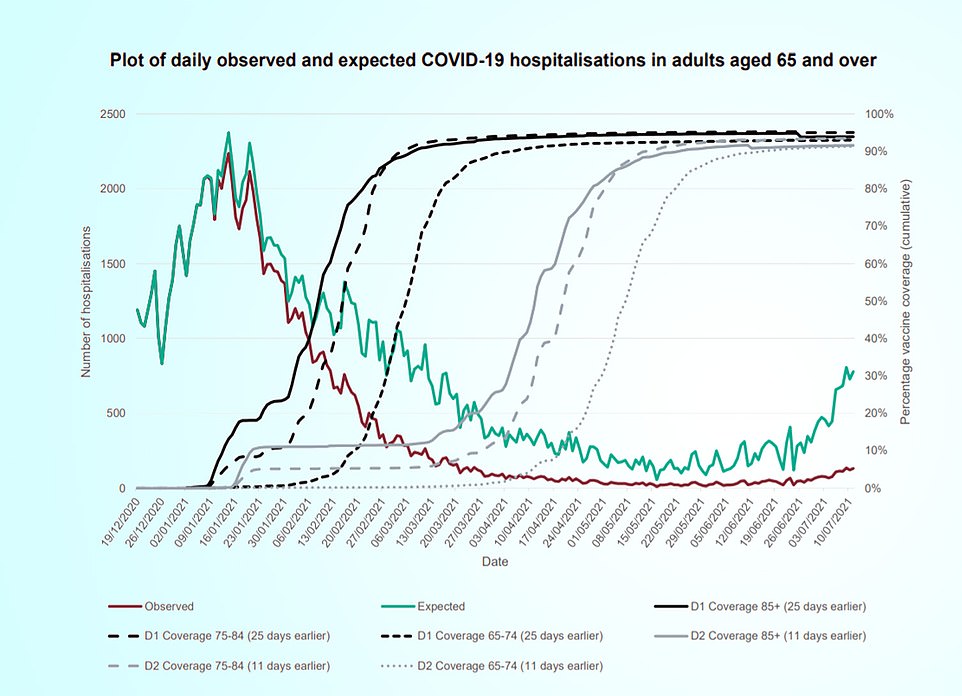
The green line shows the number of hospital admissions in the over 65 group officials would have expected by July 10 if it was not for the vaccines – roughly 750. The red line represents the actual number of over-65s admitted on that date, around 200. The other lines highlight the uptake of one (D1) or two (D2) vaccine dose in various age groups
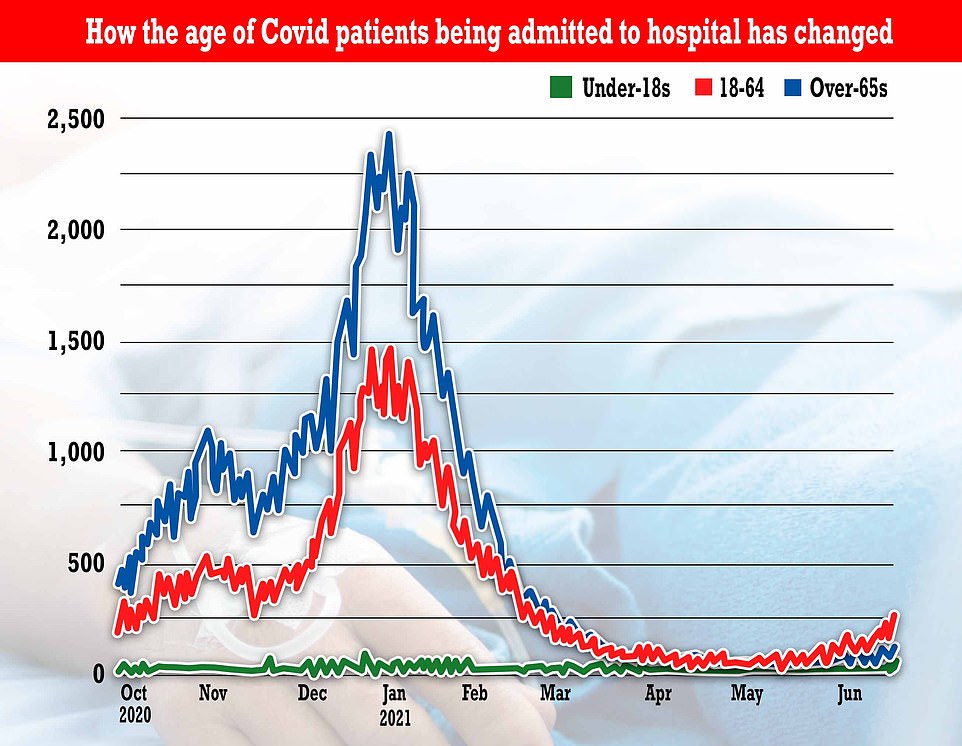
Adults under 65 (red line) now make up a bigger proportion of hospital admissions than elderly groups (blue), who were traditionally most likely to become severely ill with Covid. Elderly groups were prioritised for the vaccines and uptake has been highest in those groups, which has caused the shift. Children (green) have always been at a very small risk of the virus
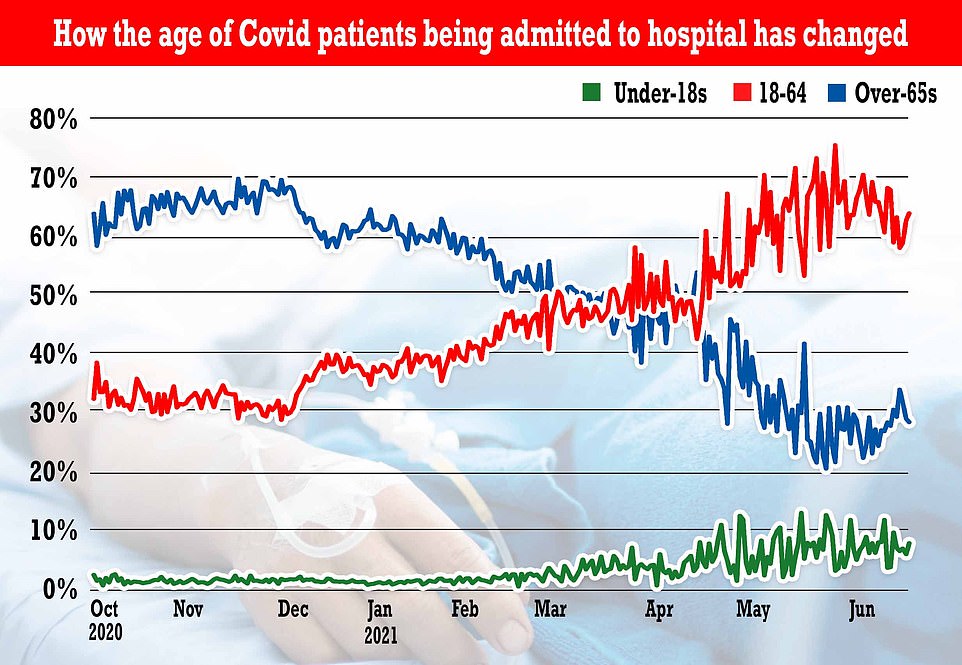
The proportion of cases is broken down by age group and highlighted as a percentage. It shows that in about March – around the time elderly groups started to enjoy protection from their second jab – young and middle aged Britons began to make up the majority of hospital admissions for the first time in the pandemic
PHE said that of the 52,600 hospital admissions prevented by the vaccines in England, 8,800 were in those aged 65 to 74, 20,300 in the 75 to 84-year-olds and 23,500 in the oldest groups.
The report added: ‘There is increasing evidence that vaccines prevent infection and transmission. The indirect effects of the vaccination programme will not be incorporated in this analysis, therefore the figure of 52,600 hospitalisations averted is likely to be an underestimate.’
Cambridge University epidemiologist Dr Raghib Ali told MailOnline: ‘This is very important. I very much welcome the release of this data and it really does confirm what we saw in the clinical trials [of the vaccines].
‘It’s the first real world evidence of the impact of the vaccines and shows clearly the effect they’ve had on admissions in the over-65s, most of whom by this time [July 10] had been given both doses. I’d expect similar results in all age groups.’
Brits warned not to wrangle a second Pfizer vaccine early
Britons have been urged not to get their second Covid jab early because it could lead to weaker protection against the virus.
A study by scientists from the country’s best universities found having at least six weeks between doses of Pfizer’s vaccine increases immunity, with eight weeks the ‘sweet spot’.
It comes amid growing concerns young people will rush to get their top-up jab prematurely so they can go on quarantine-free summer holidays to amber list destinations.
Some vaccine centres offer walk-in services, which have been accepting people who had their first Pfizer jab as little as three weeks beforehand.
The study of 500 NHS staff found waiting ten weeks rather than three weeks causes the body to produce more than twice as many antibodies to fight off the Indian ‘Delta’ Covid variant.
Professor Susanna Dunachie, a medical microbiologist at the University of Oxford, and lead author of the study said: ‘I think eight weeks is about the sweet spot for me.
‘Because [while] people do want to get the two vaccines and there is a lot of Delta out there right now, unfortunately I can’t see this virus disappearing, so you want to balance that against getting the best protection that you can.
‘And there’s also population level decisions as well.’
The Government is also due to relax self-isolation rules for people who have had both vaccines next month, which has raised fears people will try to get their second jab too early.
Advertisement
Professor Paul Hunter, an infectious disease expert at the University of East Anglia, added: ‘This is absolutely evidence the vaccines are working, doing their job in keeping hospitalisations under control.
‘It doesn’t take into account the fact we’re seeing far fewer cases than we would’ve been if it weren’t for the jabs so it’s actually an underestimate of the power of the vaccines.’
By July 10 there were roughly 30,000 daily cases across the UK and about 550 admissions of all age groups. This has risen to 45,000 infections and 750 admissions in the fortnight since.
But the vaccines have weakened the link between infection and severe illness, which is highlighted when admissions are compared to previous waves.
The last time the country was recording 45,000 cases per day was in mid-January, when there were 4,000 Covid hospitalisations each day.
Doctors are also reporting that Covid patients are less ill and stay in hospital for shorter periods than in previous waves, which is highlighted in inpatient data.
There are about 4,000 patients with Covid in hospital beds now compared to the 20,000 at the same point in the second wave.
A source who sits on one of the Government’s advisory bodies told MailOnline: ‘Thanks to the vaccines, admissions are not the same as they once were.
‘Patients presenting now are not as demanding, they are not people who are desperately sick and need a high level of medical treatment. Of course there are still some.’
It comes after MailOnline analysis yesterday showed Covid admissions are spiking in four fifths of hospitals across England and have reached their highest level in four months.
Latest official figures show the number of coronavirus patients staying overnight in hospital beds increased 36 per cent to 3,068 in the week ending July 20.
This was the highest number since March 1 when 704 Covid patients were in hospital. In the worst affected trusts, the number of inpatients has nearly quadrupled in the most recent week.
North East Anglia NHS Foundation Trust in Cambridge saw its number of patients increase from six to 23 in a week.
For comparison, just 17 of the 126 hospitals in England that can treat Covid saw their bed usage drop.
But hospitals are yet to become overwhelmed with Covid patients. Only three trusts had 10 per cent or more of their beds filled with patients with the virus.
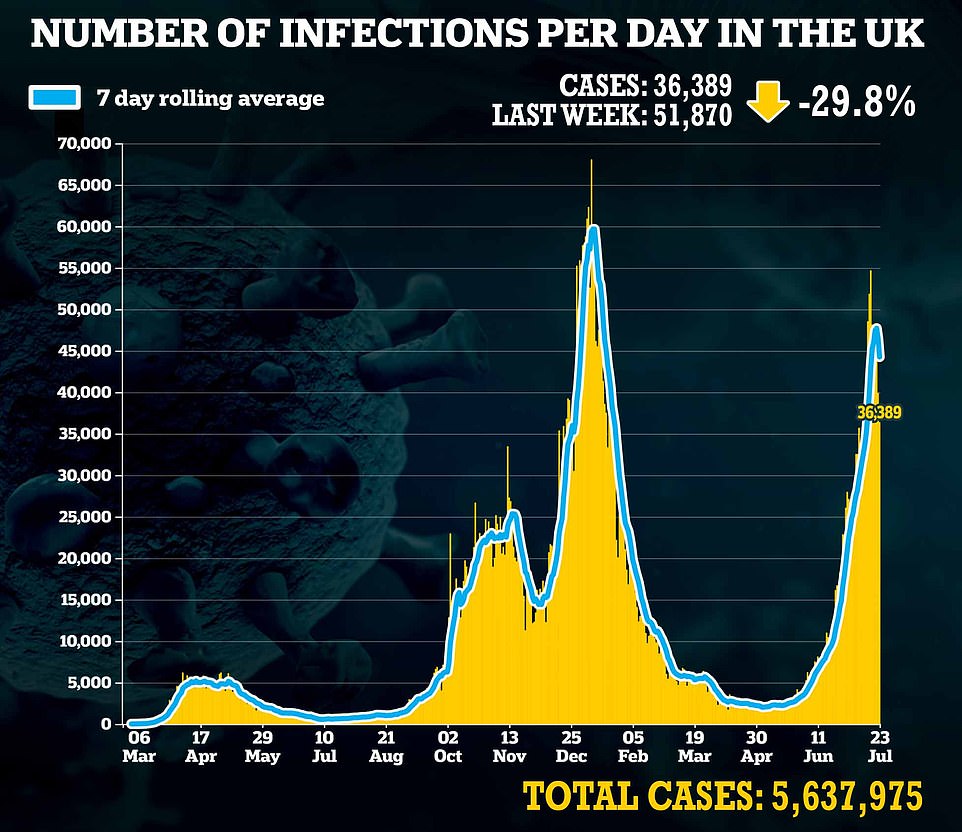
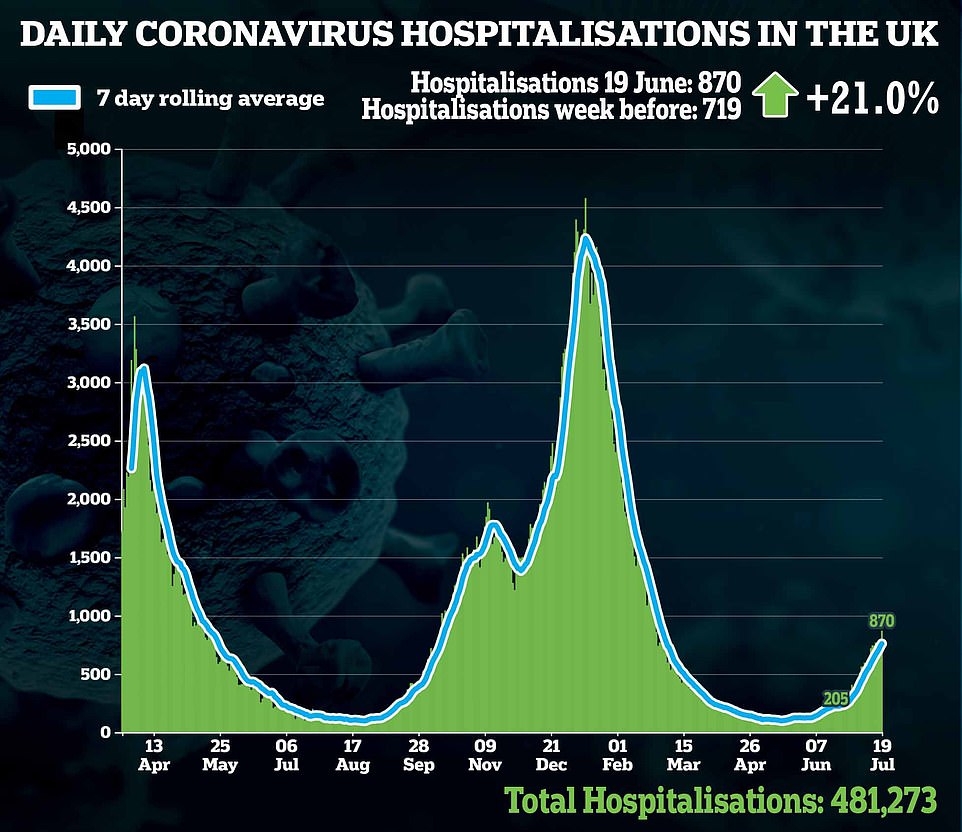
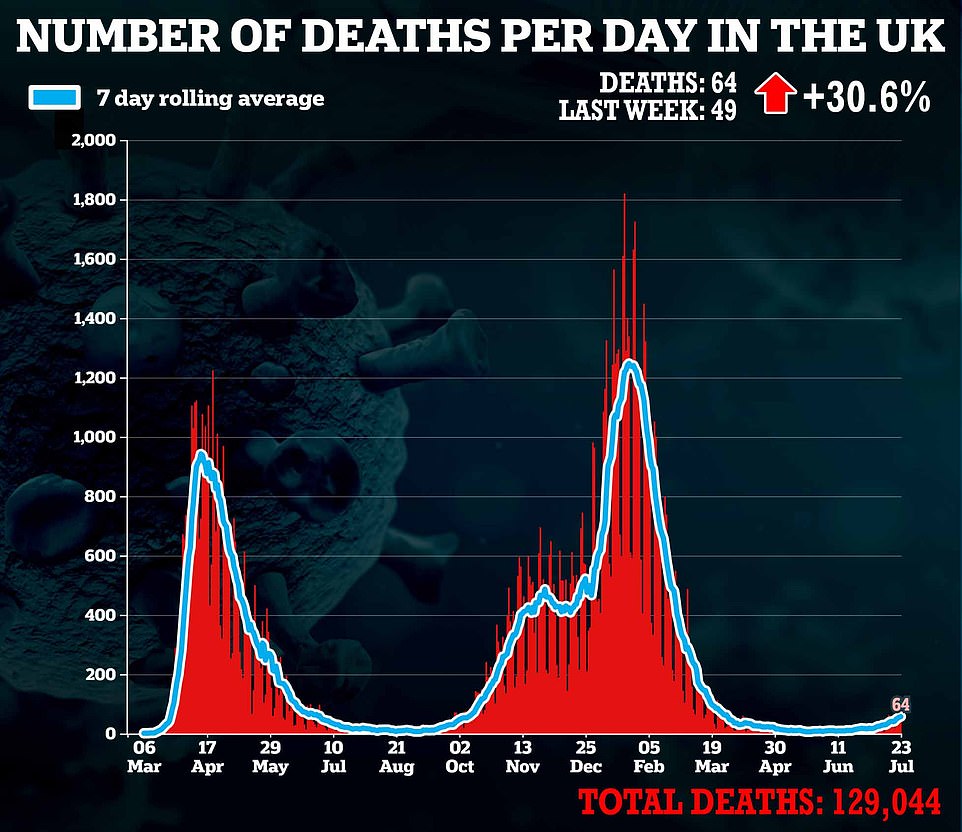
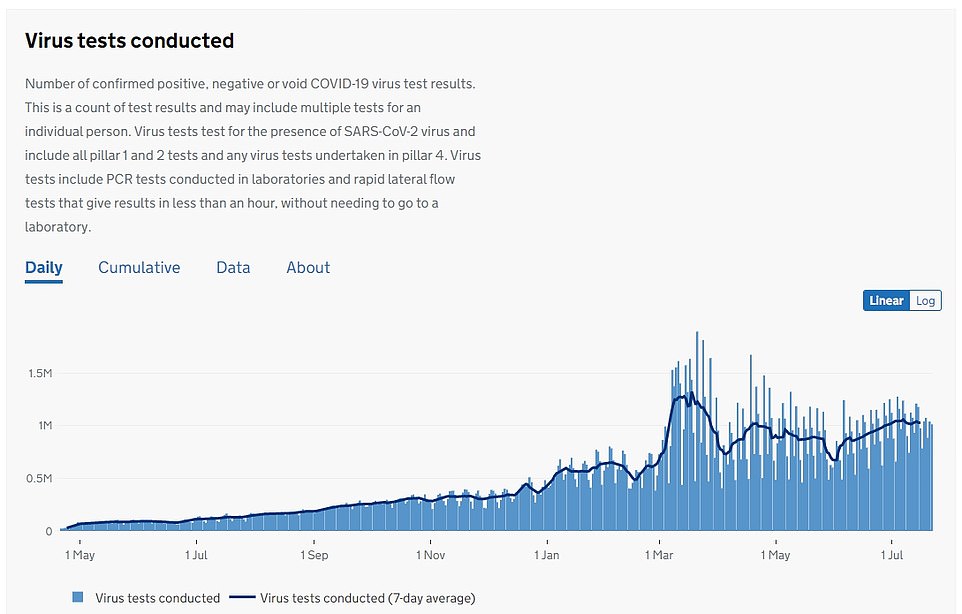
Government data shows that 14 per cent fewer tests were carried out compared to last week, which may be partly behind the fall
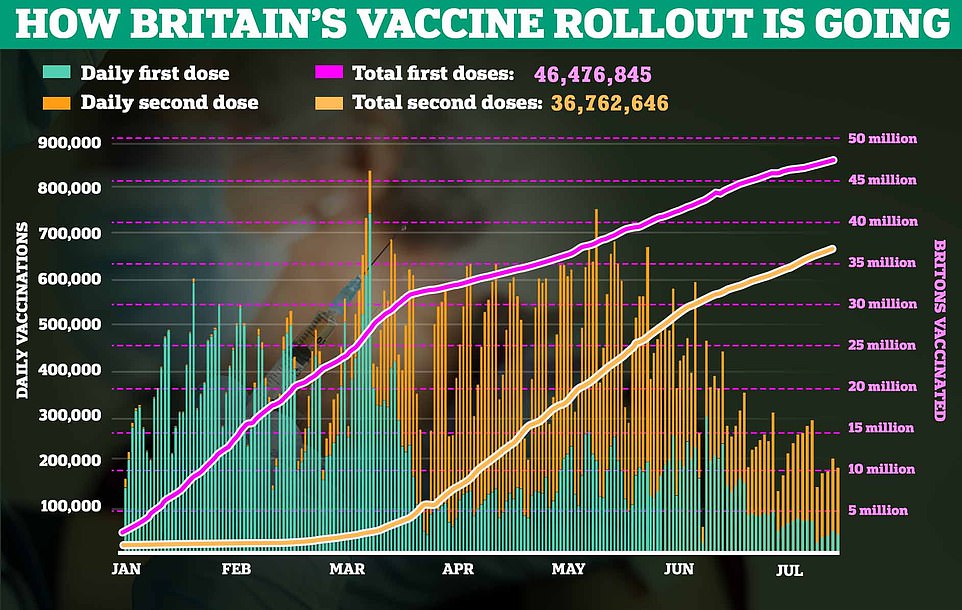
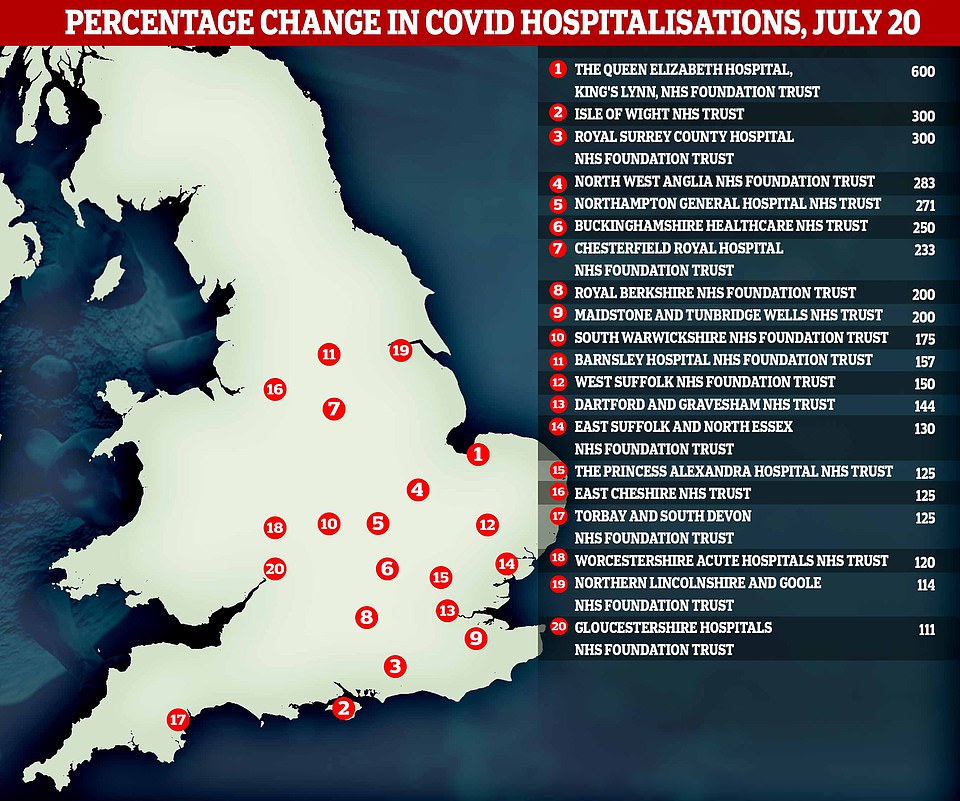
Covid admissions are spiking in four fifths of hospitals across England, official NHS data has shown as the third wave continues to pile on pressure on the NHS. Above shows the trusts which saw the largest percentage increase in admissions in the most recent week. It does not necessarily mean these hospitals were the most full
Hospitals in Kent saw nearly 45 per cent of all beds occupied by Covid-infected Brits during the darkest days of the second wave in January.
Of trusts with more than ten Covid patients, Northampton General Hospital had the second biggest jump, seeing patients increase from seven to 26 in a week.
It was followed by Chesterfield Royal Hospital, which saw a rise of 233 per cent, Royal Berkshire (200 per cent) and Maidstone and Tunbridge Wells (200 per cent) in Kent.
Regionally, the East of England saw the biggest spike in Covid patients, with the number of beds being used to treat people with the virus jumping 74 per cent to 194
The Midlands and North East and Yorkshire saw the next biggest spikes — 48.6 per cent and 42 per cent respectively — with the latter also having the highest number of beds used in England, with 745.
Gateshead Health NHS Foundation Trust had the largest proportion of beds being used by Covid patients, with 46 of its 409 capacity being taken by people infected being treated for the virus — 11.3 per cent.
Pennine Acute Hospitals Trust had the second most (10.8 per cent), while Bolton NHS Foundation Trust was the third trust to have more than one in ten of its beds used by Covid patients (10 per cent).
Eleven trusts had less than one per cent of beds being used, with Queen Victoria Hospital in West Sussex and Dorset County Hospital both having none.
Source link : https://www.dailymail.co.uk/news/article-9817867/Covid-admissions-level-Britain-didnt-vaccines.html











